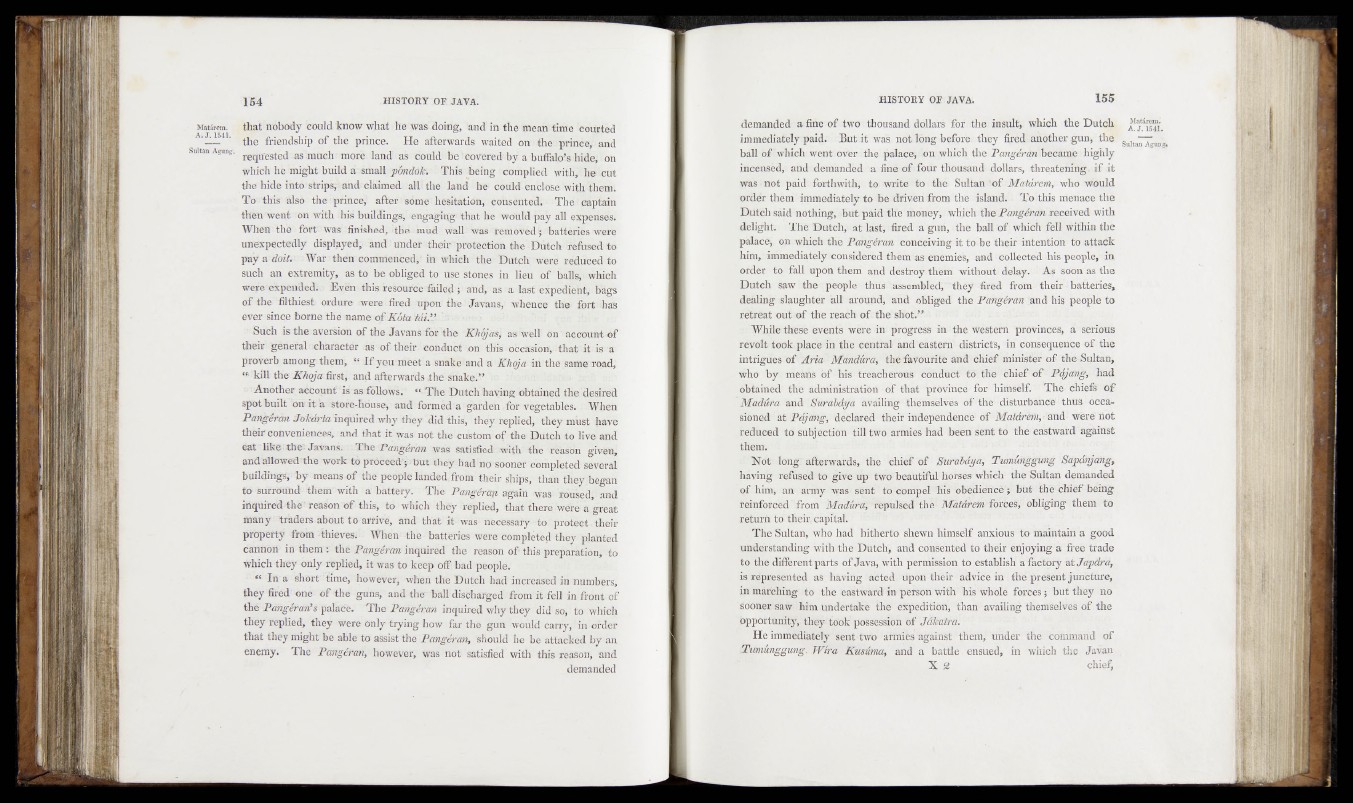
■ Matirom.
A ijl I t « .
Sultan Agung.
that nobody could know what - he was doing, and' in the mean" time courted
the friendship .of the prinhe. He afterwards waited on 'the ’ prince, - and
requ’ested-as'iinaehf morei:lan($'3i& cotfld ibeleovsMd»hyi a. on
which he might build ansiftalfrp&tddA; This being ; complied with,? he lout
the hide into• strips^and- cl&imed aiUthe land he* oouloienhlbkedwitb-them.
ToufMsalso after sdmq-hesitation,1 CbasentedC'' -The»captain
then Went - on with his buildings engaging* that'he would pay all expenses.
When ttor fbst'was’,'finished,. itbg»;Wid. wdtt1 was 'teint^iid^^batlerlls Wette
unexpectedly dispfeyfed, and1 Under theff^piWteeljidft ifeeiDutch:iiefbsedto
pay nWeitu^-Jlf^'theSn eoniniehcedj'in which ;'t|e?Datph were reduced to
such an extremity, as to be obliged to^uSe ’Stones in lieu ofJ bah^i. which
wepeiexpeaiiledio iEven this resource-failed ji and^^s ?a dasthSpCdieh^ - l^gs
of the -ffithiesfc ordure were fired .upon ftite'daYkns, whence tb» fonbihas
ever since .borne- the name of KdtaMdiP^sr
•' Such is the aversion of thejavsusfforfhe Khojas, as'Well* 6"n i account of
their general oehkracter iasvofrtheir-'Cofaduet';.on this occasion, that it igKai
prtxVerb.iamong; then®, *s Ifyno^ftella -Sna^eSand a !^%^nifti.rthe^samsn'r®adi
*•*I kill the Mbqjm first,-; and afterwards the snake.” ha
a iiAndther a^ojinf is' aaifSBows.1' “-The Dutch-haying bbtsiined the.desired
spot built c o a t s ^stefe-hOuse?' and’ formed 'a 'gaiideh rfdtw^etabfesi' When
Pangitdn Jvkdrta fnipnred why they did this!, fhdy-replied, -theymbst Jiave
then' Conveniences,: and that it was not the custom of-the Dutch to live and
eat like-the- J-aians. The Sanger an was satisfied with the reason given,
andaltowerdnhe worktb prOceed*-^ But they had i&*fMoire£ completed- several
buildings, by -means of the people landed.from their ships, than they began
to- surround- them with a- battery. The Pangeraji again Was'fbused^and
iftg^red;>thh?-1:e^ n ofr tb% to which they replied, ifihdt there.lw^re>'i;gteat
many - "traders.about 16'‘arrive, and that ft“W'asi'£(fec'fesSaiy-”to ':.proteet< their
proper^ fr&in-fekvfesi'- When--the- batteries were coft^idkd^hey planted
cannon- in them: the Pangeran inquired the reason of this preparation, to
which they only-replied, it was to keep off! bad people.
“• In a short time, however, when the Dutch had increased in numbers,
they fired one- of-the guns, and the ball discharged, from it fell in front of
the Pangeran-s palate. The Pwrighicm inquired- why they did so; to which
they replied, they were only trying how far the gun -would carry, in-order
that they might be able to assist the Pangeran., should he be attacked by an
enemy. The Pangeran, however, was. not satisfied' with this reason, and
demanded
demanded a fine- of two •. tb ousand dollars fob the insult, which the Dutch
immediately paid. Bntrit was. nótlong before. th!éy fired; another gun, thé
bill hi which: went ovbr. : the .palace?: Ion-which the: Pangdrdn became highly
incensed, andodemanded fa fine o f four thousand dollars, threatening, if it
was • not paidvfoTthwithb': tov-write to the Sültanööf 'MatdreMy who wfould
Drddr them ' immediately to tóesdrfiWaiifronjthë. h'jisl^n'dk' . To-this menace the
Dutch said nothing, -but paid the money,'.-which tlïe Pangéranijoeceived with
delight. TlïëTbutehjH.at last, fired a.gun, ithe i ball ’of which fell within the
palace, on which the Pangeran conceiving it tbibe their intention' tb attack
him^ammediately Considered thèm'’.as^dbsmie's, and - collected his people, in
, order to fall upoti’fhem and deifroy thfetn without' delay. ’ As soon as the
Dutch saw the people. rthhs-^assembled;'r they'-fifed from their i batteries,
dealing slaughter all’ around, and obliged the Parigélr&itland his people to
retreat out of the reaeh ofrthe' shbtU*-^ I
While'these events wéte in'-progress- ino-the Western 'provinces, a' serious
revolt? fodk. place in the central and eastern districts, in consequence of the
intrigues of '‘Aria 1Mandêra, thefayohrife and chiêf ’ minister of'the Sultan,
Who b y mfeaüè of "his- ttóachëroiisfr‘^nSuct* fd- thëhêhrofr'-of' Pdjdng,1 -had
Obtained thfe a'dminiètratióif^of - that pröviriceJfer-fh im sê lf.The- Chïefë,'ïof
Madura and Surabch/a avdiling'^Heihshf^s óf the'-disturbanefe" thus occasioned
M Pdjehng, declared their iridêp’èndénèë* of -Afedra»J< and were' riot
rediieed té sübféfcMö'ö-'-till two armies had .been sent to the- eastward- against
them.
.■ I’ -Nét. -longr afterwards, the chief of • Surtibdya, Ttmunggurig Sapamjahg,
having refused to give-up two'-beautiful horses which the Sultan demanded
of him; -'an- army was-- sent• tb-'c'ompeï*:Iiis öbédiëricë’; but- the chief being
reinforced froiri'- AfadM^^f^pid'sed' thh- MatAhem forces’,1 obliging them to
feturri'to'their, capita® r I3
. ‘The Sultan, who had hitherto shewn 'mjns'élf anxious^Ib maintain a good
understanding with the Dutch, and co’hsentedfo theirénjoyinga free trade
to -the different parts of Java, with permission to establish’ afaetpry at Japdra,
is represented as having acted . lipon their advice in the.present juncture,
in marching to the feastwkrd’-in person with his whole forces $ but they no
sooner saw him undertake the expedition, than availing themselves of the
opportunity, they took’ possession óf Jdhatra.
He immediately sent two armies against them, under the command of
Tumunggung. Wira Kustima, and a battle ensued, in which the Javan
X | chief,